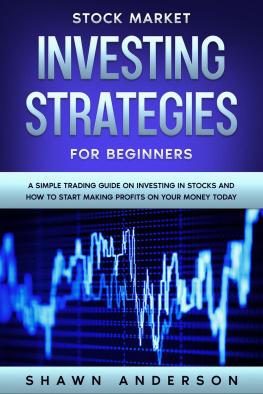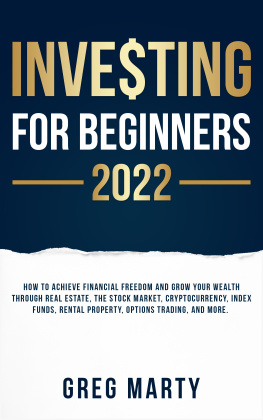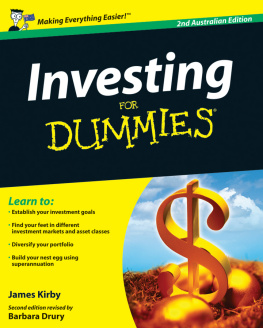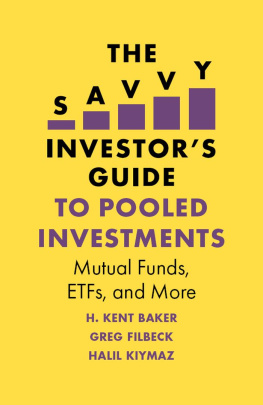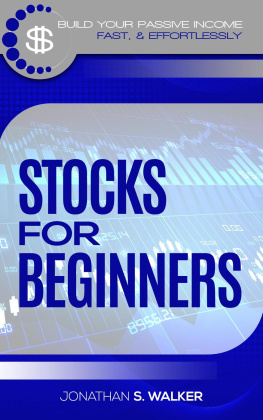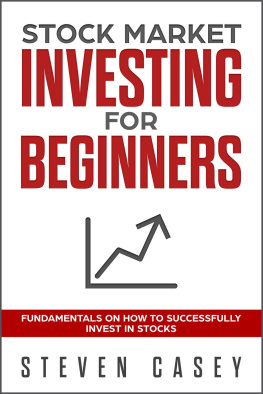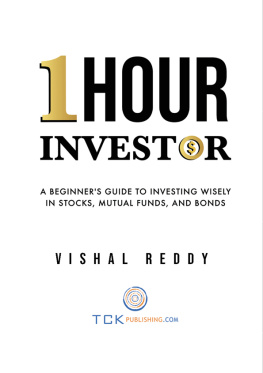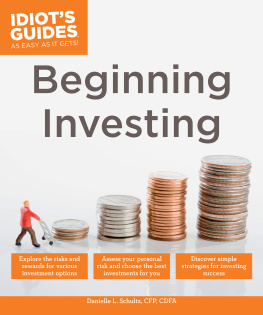Mastering Stocks - A Beginner's Guide to the Stock Market
Adidas Wilson
Published by Adidas Wilson, 2020.
Copyright 2020 by Adidas Wilson
All rights reserved. No part of this publication may be reproduced, distributed, or transmitted in any form or by any means, including photocopying, recording, or other electronic or mechanical methods, without the prior written permission of the publisher, except in the case of brief quotations embodied in critical reviews and certain other non-commercial uses permitted by copyright law. For permission requests, write to the publisher, addressed Attention: Permissions Coordinator, at the address below.
Financierpro, Publishing
Adidas Wilson
P.O. Box 2262
Antioch, Tn. 37011
Financierpro007@gmail.com
www.financierpro.com
Disclaimer
T HE AUTHOR HAS MADE every effort to ensure the accuracy of the information within this book was correct at time of publication. The author does not assume and hereby disclaims any liability to any party for any loss, damage, or disruption caused by errors or omissions, whether such errors or omissions result from accident, negligence, or any other cause.
I ntroduction
Ch. 1 How to Invest in Stocks
Ch. 2 - Explore ETFs
Ch. 3 - The Warren Buffett Way
Ch. 4 - Dividend Investing
Ch. 5 Mutual Funds
Ch. 6 Stock Sectors
Ch. 7 Day Trading
Ch. 8 Growth Stocks
Ch. 9 The Secret
Conclusion
B efore purchasing a stock, ask yourself how volatile it will be. The volatility of a stock can be determined by checking its beta. Less volatile stocks have a beta that is less than one. Past performance may not affect future results. However, there are historical patterns that will continue. If a stock has a history of consistent earnings and profitability, this trend is likely to continue. While doing research, be sure to check the history. These common mistakes can cost you a lot: Purchasing penny stocks: stay away from stocks that do not trade on the NYSE or NASDAQ and those that trade for less than $5. Relying on rumors: do not buy a stock because people say that it is about to do something. Do your research. Using margin: margin is borrowed money. As a beginner, stay away from it. According to Warren Buffet, you do not need impeccable business insights, inside information, or an unusually high IQ to become a successful investor. All you need is the ability to control your emotions and a sound intellectual framework. If you talk to any veteran investor, they will tell you that a plan of attack is very crucial. Coming up with the plan is a little easy; what is difficult is sticking to it even when things are against you. In this book, you will understand the importance of a plan and the implications of not having one. You will also learn the factors to consider when creating one and the best investment vehicle options for you. If you can stay the course despite what everyone else thinks, forecasts of analysts, and prevailing trends, then you will have a better chance of growing your investments. Financial markets are, by nature, volatile. There have been so many ups and downs over the last century caused by new technologies, inflation, business cycles, recessions, and interest rates. The 90s, for instance were great because of increased use of computers and decreased interest rates and inflation. However, 2000-2002 was not a great period. There were so many corporate accounting scandals and other issues which led to a weak market sentiment. When the environment is this shaky and fragile, it is important to have your emotions in check. Do not deviate from your investment plan. This allows you to focus on the long-term and have a more objective view. These sins play off three primary emotions: greed, fear, and hope. Fear makes you sell too low. You freak out when the prices plunge and sell without giving it much thought. In times like these, go back and check your original reasons for investing in the companywhether they have changed. Hope should not be your main motivator. When investing, focus less on past performances and more on the fundamentals of the company. Greed makes you stick onto something for too long for some extra points. When you hold on for too long, a huge gain can easily become a loss. What do you hope to achieve? There are three primary categories of objectives: growth, income, and safety. You always hear people say that investing in the stock market is a wise thing to do. But how exactly do you do that? Here is the ultimate blueprint for complete beginners. Who Can Invest? When someone mentions investors, many think of Warren Buffet and other affluent people. That may have been true in the pastmost people did not have the time or money to commit to the stock market. But things have changed now, thanks to the internet. Anyone can become an investor with just a few dollars. Even you can start today. There is a lot of bad news all over. You can barely find anything positive to read about the stock market. This could possibly make you think that you should wait for a better time to invest. Instead of focusing on the loss of value by stocks, think long-term. The stock market gives a return of 10%, on average. The exact number will depend on the type of stock and it varies by year. For better returns, you should continue investing and diversify your portfolio. Time Is Your Friend: Compound Interest - The sooner you begin investing, the more money you are likely to earn. So, if you are in your 20s, this is the perfect time. Do not worry if you are older; you can still benefit. Stock prices are falling in this COVID 19 eraso it is a good time for great deals. If history is anything to go by (and it is), stock prices rise after a crash. Younger people should investigate long-term investments like stocks since they are far from retiring. Older people should avoid the risk and go for safer investments. Which Type of Investor Are You? Do not invest if you do not know have a long-term goal. A robo advisor or hedge fund manager would be helpful for people who do not know where to begin. If you are a DIY person, find a stockbroker and get to work. A group of similar investments is known as an asset class. You can either invest in a single asset class or several. Mixing asset classes is known as diversification and protects you from risks. Basic asset classes include: Precious materials and commodities , Cash , Futures, Stocks, Bonds, and Real estate. This is the part where you determine your financial goals. What are you investing for? How much do you need? When will the event occur? Here are some of the popular strategies: Peer-to-peer lending , Real estate , Growth investing , and Buy-and-hold investing. A budget will help you save for investment. You do not need anything fancy; a paper and pen or spreadsheet will do. Investment expensesmutual fund loads, commissions, etc. can greatly reduce your returns. Find an investment type with little or no fees. What Next? Luckily, you do not have to walk this journey alone. Sites like Investment Junkie have services for both the DIY investor and passive investor. All you must do is choose the service you want. Fidelity offers a range of knowledge as well for beginner investors. You hear stories of how a startup company made it big and generated great wealth for its investors. Investing in companies while they are still young can make you wealthy. But according to many people, only the wealthy can invest in startups. It does not seem like an investment for the average citizen.








